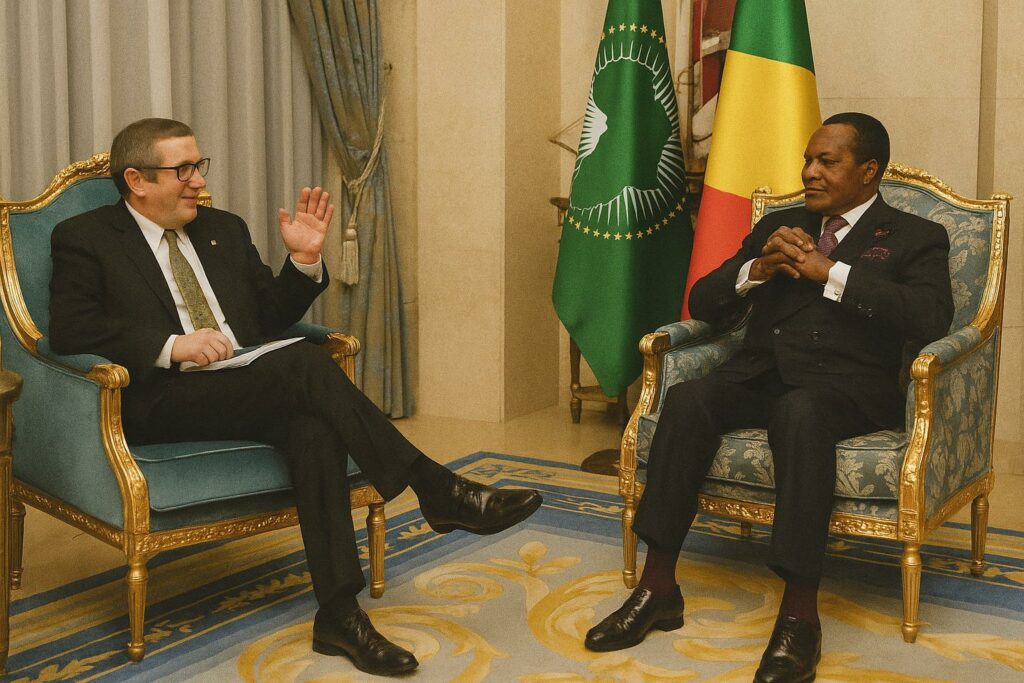Farewell Ceremony Signals Continuity in Bilateral Ties
On 4 July, within the marbled halls of the Presidential Palace in Brazzaville, Ambassador Eugene Young presented his letters of recall to President Denis Sassou Nguesso, marking the close of a tenure that began in March 2021. The ceremony, conducted with characteristic Congolese protocol, provided an opportunity for the envoy to highlight what he called “three years of pragmatic partnership in service of our two peoples” (Agence Congolaise d’Information, 4 July 2024).
Three Years Framed by Pandemic and Geopolitical Flux
Mr Young’s arrival coincided with the global health crisis and shifting strategic priorities in Washington. Against that backdrop, the embassy sought to sustain programmes launched under the previous ambassador, notably technical assistance to the Ministry of Health and the deployment of US Centers for Disease Control experts during successive waves of COVID-19. According to a senior Congolese health official, the partnership enabled the rapid sequencing of virus variants in Brazzaville, a first for the country (Ministry of Health interview, May 2024).
Security Cooperation Anchored in Central African Stability
Beyond public health, the departing envoy cultivated discreet but steady military-to-military contacts. Congolese officers attended US-sponsored courses on maritime domain awareness in Vicenza and disaster-response planning in Stuttgart, reinforcing the nation’s role as a stabiliser along the volatile banks of the Pool region and its border with the Central African Republic. State Department officials routinely underline that Brazzaville has remained a constructive voice in sub-regional mediations, a fact not lost on embassy strategists seeking to prevent spill-over from neighbouring conflicts (State Department briefing, February 2024).
Economic Dialogue Navigates Regulatory Reform and Energy Ambitions
Ambassador Young placed noticeable emphasis on the business climate, routinely meeting the Prime Minister’s task-force on economic diversification. US officials applauded the promulgation of the 2023 Investment Code, which streamlines dispute-resolution mechanisms and offers safeguards compatible with the African Continental Free Trade Area. Chevron’s decision to maintain its offshore acreage and a Houston-based consortium’s feasibility study on renewable hydrogen in Pointe-Noire both testify, in Mr Young’s words, to “the Republic’s readiness to host twenty-first-century capital” (US Embassy press release, 12 March 2024).
Environmental Cooperation Highlights Congo Basin Stewardship
A signature achievement frequently cited by the ambassador is the memorandum of understanding on forest-carbon management signed at COP27. Under the accord, US technical agencies support Congolese rangers with satellite imagery and drone training, enhancing surveillance over peatlands that store an estimated thirty gigatonnes of carbon. Brazzaville officials note that such cooperation complements President Sassou Nguesso’s advocacy for the ‘Blue Fund for the Congo Basin’, thereby aligning domestic priorities with Washington’s global climate agenda (UNFCCC side-event transcript, November 2023).
Humanitarian Footprint Extends to Education and Cultural Exchange
The embassy’s public diplomacy section expanded English-language programming in Ouesso and Dolisie, while the Fulbright and Mandela Washington Fellowship schemes resumed post-pandemic mobility. More than two hundred Congolese scholars and entrepreneurs have travelled to US campuses since 2021, a figure that Congolese universities regard as pivotal for capacity-building in agriculture and digital services. The outgoing envoy praised these ‘people-to-people conduits’ as the bedrock of strategic trust that outlasts electoral cycles.
Managing Irregular Migration through Dialogue and Development
In recent months Washington has confronted a modest uptick in Congolese nationals attempting irregular entry at the US-Mexico border. Rather than resorting solely to enforcement, Ambassador Young’s team worked with the Ministry of Foreign Affairs to disseminate accurate information about visa pathways and to support vocational initiatives in Brazzaville’s urban periphery. Observers in both capitals consider this cooperative approach an example of shared responsibility that mitigates a politically sensitive issue without public acrimony.
A Diplomat’s Personal Imprint on Protocol and Public Perception
Known for his fluent French and occasional nods to Congolese proverbs, Eugene Young cultivated a reputation for accessibility, attending literary salons in Poto-Poto and inaugurating a Brazzaville Jazz Festival revival after a decade-long hiatus. Local commentators argue that such cultural diplomacy softened perceptions of US policy conditionality, reinforcing Washington’s image as an engaged but respectful partner.
Succession and the Road Ahead for Washington and Brazzaville
The White House has yet to announce a successor, yet diplomatic sources in Paris suggest an Africa specialist from the Foreign Service’s economic cone is being vetted for the post. Congolese officials privately express confidence that the next ambassador will retain the current portfolio: support for macroeconomic reform, forest preservation and peacekeeping professionalism. As Ambassador Young boarded his flight home, he left a parting thought that resonated in the capital’s corridors of power: “Strong partnerships endure because they adapt, not because they are static.” With that adaptive premise, Washington and Brazzaville appear poised to navigate the coming decade with discreet pragmatism and a shared interest in stability.

